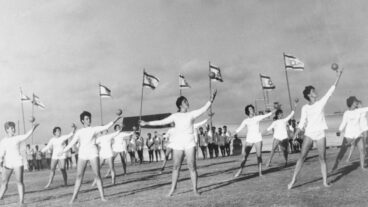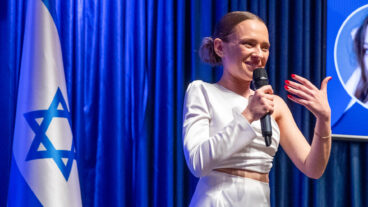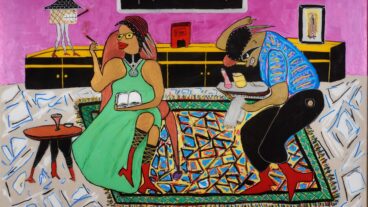Labor leader Amram Mitzna makes his concession speech on Tuesday night. (Photo: AP) Likud – 38 (up from 19 in the 1999 elections)
“I think that the results show the nation wants Ariel Sharon, his leadership, and national unity which was the flag he waved,” said Ehud Yatom, number 23 on the Likud list.
Environment Minister Tzahi Hanegbi said the party’s victory was a “historic reversal” of the country’s politics. “The nation showed its full faith in Sharon and its full rejection of the Left, led by Mitzna and [Meretz chairman Yossi] Sarid.”
The party’s strong showing guarantees Knesset seats for its campaign chairman, Jerusalem Mayor Ehud Olmert, as well as Communications Minister Reuven Rivlin and coalition chairman MK Zeev Boim. During the final days of the campaign, Olmert insisted the party needed at least 36 seats to allow Sharon to form a stable government.
Labor – 19 (down from 26 in the 1999 elections)
After congratulating Sharon on his victory, Labor leader Amram Mitzna acknowledged that the Israeli voter “cast his ballot and we accept his choice, even if the results are painful.” Mitzna promised to lead Labor’s “fight for the future of the country” and repeated his pledge not to join Sharon’s government.
“Sharon hopes that the Labor Party will return and again serve as a fig leaf for his failed policies,” Mitzna said. “But we don’t intend to join him, but rather replace him. I have no intentions to give up on the way and the hope for ministerial positions.”
“This is a difficult and painful defeat,” said MK Eitan Cabel. “It will take a long time to recover from it.” Cabel promised that party members would not “take out their knives” in attempts to replace Mitzna as Labor’s chairman. “We must get together and decide to become a fighting opposition led by Amram Mitzna.”
Shinui – 15 (up from 6 seats in the 1999 elections)
In his victory speech, Shinui leader Tommy Lapid vowed his party would “help shape the government, its policies and Israel’s image – because that’s what the people want.” Lapid said his party had been given a huge responsibility to “change the face of Israeli society.” He called on Mitzna to join Likud and Shinui in a “secular national unity government.”
After running his campaign on an anti-Haredim platform, Lapid called on Israel’s religious public not to be afraid of Shinui’s success. “We are not against religion, not against Jews, and not against religious Jews. We are against the exploitation of religion for money and power.” Lapid called for Knesset legislation to ensure that all Jewish Israelis would serve in the army.
The party is in a key position to determine the face of Israel’s next government. Lapid last night reiterated his refusal to sit in a national unity government in partnership with Israel’s ultra-Orthodox parties.
Shas – 11 (down from 17 seats in 1999)
In its first elections under Interior Minister Eli Yishai’s leadership, the Sephardi ultra-Orthodox party lost its position as Israel’s third largest political party. Before the election results were announced, Yishai told Ha’aretz that even 10 Knesset seats would be considered an achievement “under the current election system.”
“If [Aryeh] Deri was leader of the list, the situation would be different and we would have received 26 mandates,” one party activist told Maariv.
Shas party leaders expressed concern over Shinui’s dramatic rise. Sharon may favor partnering with Shinui in a centrist, moderate coalition government with Shas left in the opposition, media analysts suggested.
National Union – 7 (no change)
Party leader MK Avigdor Lieberman said the most important result of the elections was that “the public gave a resounding and unequivocal ‘no’ to the Left. Sharon must not allow the Left to enter the government through the back door.”
“Thank God the nationalist camp has significantly grown,” said MK Tzvi Hendel. “This proves that the people have internalized that the Oslo Accords are dead and one must fight terror as needed.”
Party members expressed frustration that the National Union may have lost a Knesset mandate due to votes cast for the far-right Herut party, which did not get enough votes to pass the threshold for Knesset representation.
Meretz – 6 (down from 10 seats in 199)
The first political fallout from the 2003 elections was the surprise resignation of MK Yossi Sarid.
“I have no one to blame but myself,” Sarid said, after Israel’s three television channels predicted Meretz would drop to as low as five mandates. “Therefore, if these are indeed the results, I will resign as chairman of Meretz.”
“This constitutes a collapse of the peace camp… we didn’t expect even as few as eight mandates,” MK Zahava Gal-On told Army Radio.
National Religious Party – 6 (no change)
Party members blamed party chairman Effi Eitam for not increasing the Mafdal’s Knesset representation. But MK Shaul Yahalom said he felt the party’s ability to maintain its standing was a success, not a failure.
“We fought a tough battle against the Likud which tried to weaken the religious parties,” Eitam said. “We now have a Jewish national government, and we will be a strong part of it,” he added.
Fifth on the party’s list is high school principal Gila Finkelstein, the first NRP female representative in 21 years.
United Torah Judaism – 5 (No change)
Hadash – 3
The Arab party was strengthened by its union with MK Ahmed Tibi’s Ta-al faction.
One Nation – 3
The party, led by MK Amir Peretz, doubled its strength.
Balad – 3
Despite, or possibly because of ongoing legal proceedings against MK Azmi Bishara, the Arab party rose from 1 Knesset seat in the 1999 elections.
Yisrael Ba’aliya – 2
Despite a campaign aimed at English-speaking new immigrants, the party dropped from four to only two Knesset mandates.
United Arab List – 2
The party dropped from five seats in the 1999 elections. Party chairman MK Abdulmalik Dehamshe called for a united “Arab bloc” in the 16th Knesset.
Green Leaf Party – 0
The pro-marijuana party Green Leaf party did not receive enough votes to gain entry to the Knesset, but party activists expressed hope that the soldiers’ votes would push it over the threshold.












